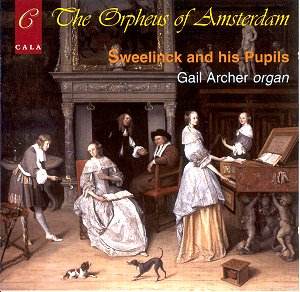On
paper this makes for an interesting recital. Gail Archer is
a teacher at Barnard College, Columbia University, and her own
booklet notes are a model of informed comment. In fact it is
almost a case of: read the booklet and set yourself up for disappointment.
Ms Archer's enthusiasm for her repertoire - she is an active
early music editor, too - alas does not seem to extend to actually
creating the pieces as sonic entities.
Sweelinck's
Toccata in C that opens the recital is in fact quite bright
and generally breezy. Problems really begin with the Scheidt
Echo ad manuale duplex, forte & lene from his 1624
collection Tabulatura nova. Ponderous in the extreme,
this chunders along in its own sweet time and wears extremely
thin by the end. In direct contrast to her booklet notes, Archer
actually sounds bored. And it's catching. Malle Sijmen
('Silly Simon'), allegedly a dance-tune (a bit awkward to dance
to this version) continues to reveal Sweelinck's bright nature.
The twelve-minute Ricercar is indeed a wonderful piece
of music and it is fitting it is placed at the very end of the
recital.
Heinrich
Scheidemann was, like Scheidt, a pupil of Sweelinck. According
to Archer, Scheidemann the man was, 'friendly and affable ...
merry and full of humour'. One would never guess it from his
music. Apparently the Magnificat settings are Scheidemann's
'most distinguished compositions’. Archer's rhythmic liberties
can seem distortive, so maybe it is not fair to judge on this
airing. Versus I reminds the listener viscerally of the
ponderous nature of the Scheidt, only it is more so. The third
part, 'Versus auf 2 Clavier', manages to form a plateau of repose.
Scheidt's
Variations on Est-ce Mars is a secular work that demonstrates
Scheidt's contrapuntal prowess and far-reaching imagination.
Archer's sense of directionality - melodic and harmonic - again
threatens to scupper the musical processes here. Variation 7
is the most successful, dainty in its high register emphasis.
Colin
Clarke
see also Review
by Chris Bragg














